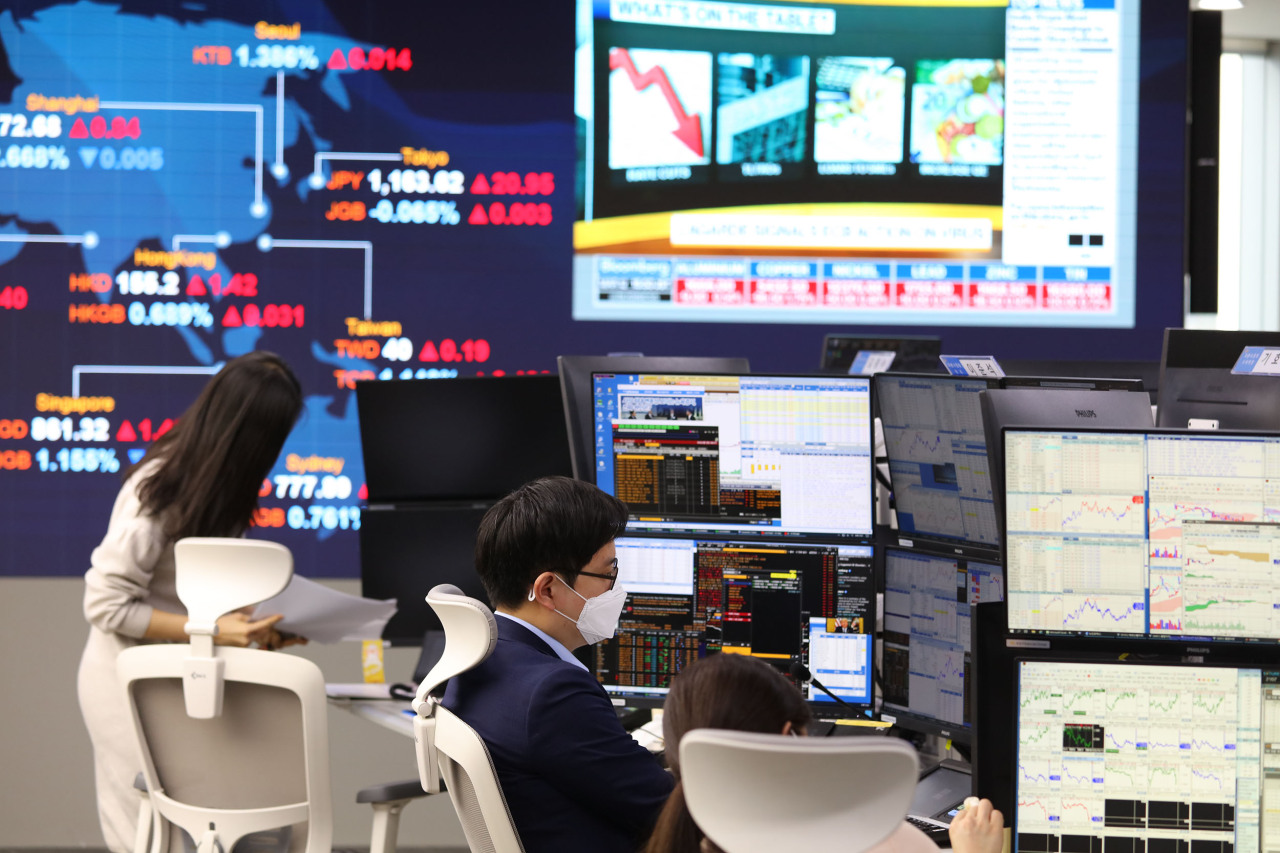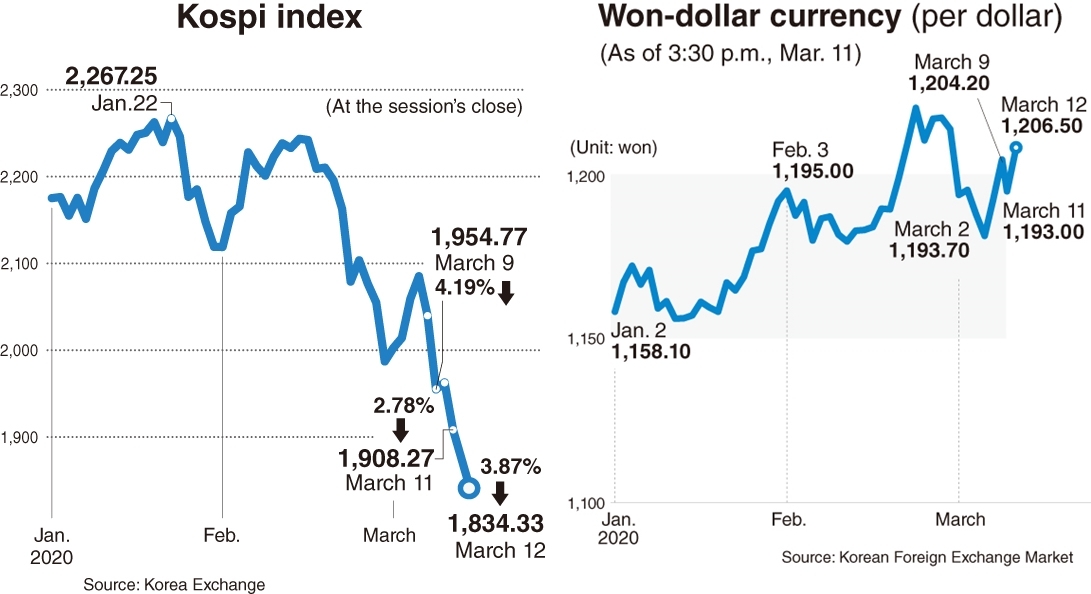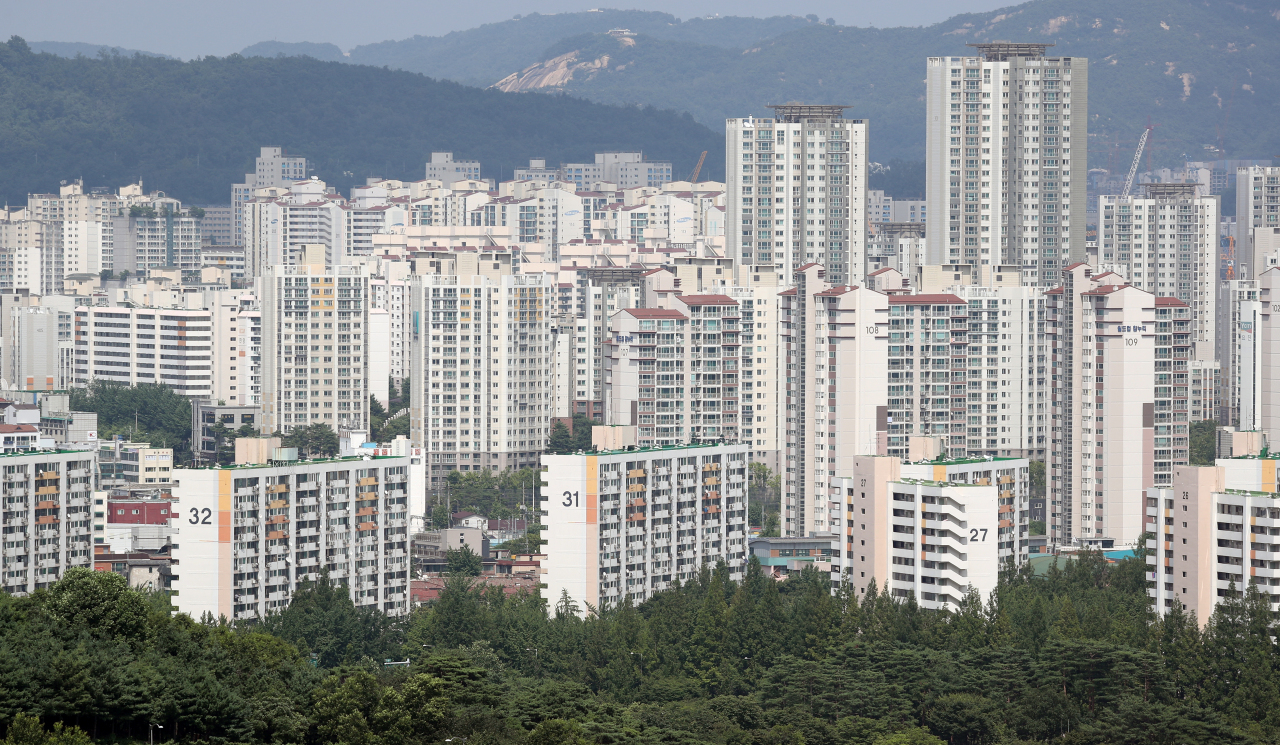 |
Currency dealers of KB Kookmin Bank in Yeouido, Seoul. (KB Kookmin Bank) |
The coronavirus outbreak, now declared to be a pandemic by the World Health Organization this week, has started to send shockwaves across the global economy and markets that have prospered for years on the back of ultra-low interest rates, relatively stable energy prices and the increased productivity of the corporate sector.
The economic shock of COVID-19 could be a lot like the 2008 financial meltdown, economists have warned, reminding investors of South Korea’s painful past 12 years ago, when the economic growth rate dived to 0.8 percent and real estate value and stock market indexes hit record-low levels.
Market eyes are now on how far figures will have fallen in the end, and how long this financial contagion will last before the anticipated recovery.
Based on reports, data and interviews, The Korea Herald examines markets from equities and investments to real estate within Asia’s fourth-largest economy -- before and after the outbreak -- the changing landscape of the nation’s financial sector over fears of economic crisis and the prospect of the markets in a time of uncertainty and potential vulnerability.
Stocks in steep decline
Despite the market forecast that stock indexes would gain vitality this year, the nation’s main bourse Kospi hit its lowest point in over four years on a selling spree by foreign investors.
The Kospi index reached its highest recent point, 2,267.25 points, on Jan. 22, two days after the first COVID-19 case was confirmed. In less than seven weeks, the Kospi crumbled, declining 284.92 points to 1,954.77 as of March 9 from 2,239.69 on Jan. 21. Foreign investors offloaded 8.7 trillion won ($7.2 billion) of stocks in the given period, according to data compiled by the Bank of Korea.
The net amount sold exceeded that seen during earlier outbreaks of SARS, swine flu and MERS. During the severe acute respiratory syndrome outbreak in 2003, offshore investors sold 1 trillion won in stocks. Foreigners’ net purchases recorded 5.6 trillion won and 100 billion won, respectively, during the swine flu and Middle East respiratory syndrome outbreaks.

Due to their recent massive selling spree, the market capitalization of foreigners shed about 90 trillion won to 532 trillion won from Feb. 20 to Wednesday. It also caused 268.7 trillion won in market cap to disappear.
It took 12 trading sessions to see a rebound after the MERS outbreak, but uncertainty lingers as to how long the COVID-19 outbreak will last. According to The Korea Herald’s survey conducted at the beginning of the year, the yearly band of the Kospi index was expected to move in the 1,900-2,450 range. Local analysts have recently lowered their predictions, setting the range at 1,700-1,850 points.
“For now, we’ve lowered the possible lowest point of Kospi to the 1,800-point level. However, if the coronavirus outbreak even influences credit risk, then the index may dip to the 1,700-point level,” said Park So-yeon, an analyst at Korea Investment & Securities. At the same time, she expected increased purchases of local bonds, as investors will prefer low-risk assets.
The local currency closed at 1,206.5 won against the greenback -- weakening 13.5 won from the previous session’s close. It recorded the biggest drop since Aug. 5 last year, when the dollar gained 17.3 won.
Fear spreads to real estate
The domestic housing market, which has been booming for the past several years, now faces a bumpy road ahead, as the virus crisis could hurt demand despite the central bank’s anticipated base rate cut in the coming days.
The BOK has kept its base rate at the record low of 1.25 percent since November. A lower interest rate is expected to allow investors to have more leverage when purchasing houses, which could lead to surge in housing prices. Some analysts, however, said that things could be different this time because of pent-up fears over a looming financial crisis caused by the virus coupled with the government’s strict regulations on mortgages.
“In the short run, the upcoming rate cut could temporarily drive up demand in areas which are under less strict real estate rules,” said Ham Young-jin, an analyst from property tech firm Zigbang.
“In the long run, however, a potential global financial crisis stemming from the virus can put a great amount of pressure on the entire economy, including the real estate sector, and cause a drop in transactions.”
 |
(Yonhap) |
The commercial real estate segment will also likely feel the pinch if the pandemic causes a global economic downturn, according to property management firm CBRE.
“A negative impact on demand for office space is inevitable if the coronavirus crisis lingers,” the company said in a recent report.
The retail sector has borne the brunt of the coronavirus outbreak, as even retail giants like Louis Vuitton have canceled or postponed launches of offline stores in Korea, according to the property management firm.
M&A dealmakers’ second thoughtsThe escalating fear of coronavirus is triggering second thoughts about mergers and acquisitions, as potential buyers are increasingly hesitant to bet big on costly targets that will incur debt pressure.
Putting M&A negotiations on hold are changes in people's behavior coupled with ongoing financial uncertainties, in a market that closed a combined 53.1 trillion won of deals in 2019, dealmakers said.
“Many M&A lawyers murmur that the first half of 2020 has been busted already,” said Lee Jin-kook, a partner at Korean law firm Yulchon.
Lee cited people’s aversion to face-to-face meetings due to the contagious coronavirus.
“M&A transactions naturally are not friendly with the so-called ‘untact’ work process, whether for internal meetings of either party or for interparty negotiations,” Lee said. “Untact” refers to the trend to minimize face-to-face contact, or “undo contact.”
Especially for cross-border deals -- which account for 30 percent of the 438 deals closed here last year -- threats loom larger when it comes to foreign currency risk hedging for potential buyers.
“Once parties concerned sign an M&A deal, it still takes time to complete the transaction, and there are possibilities that currency volatility might become wider in the meantime than it is now,” said Chang Jae-young, a partner at law firm Shin & Kim.
“If the Korean won weakens drastically at a certain point, which is not so much the case now, Korean buyers of the foreign company will face mounting pressure to leverage the deal.”
As for deals that have already been inked, sellers are more likely than buyers to be in a rush, as assets could lose their value.
Korea’s M&A scene has already seen such declines from buyers’ perspective, especially in sectors affected by shrinking consumer demand.
Low-cost carrier Jeju Air bought a controlling stake in Eastar Air at a price that was roughly 15 billion won lower than previously estimated. Investment house IMM Private Equity bought new shares of listed travel agency HanaTour at 5.8 billion won lower than what had earlier been announced earlier, as the purchase price of listed firms’ shares was pegged at the market price under Korean rules.
“Sellers will be pressured to wrap up the transaction before things get worse, even by cutting the estimated cost of the firms up for sale,” Chang said.
Buyers, on the other hand, are unlikely to cancel acquisition plans at this moment, because exercising their termination rights, on the basis of what are labeled “material adverse effects,” is unlikely in the event of the pandemic.
“Buyers might try to resort to the MAEs, but the legal interpretation of the typical clause seems not to be so favorable to buyers,” Lee said.
By Kim Young-won (
wone0102@heraldcorp.com), Son Ji-hyoung (
consnow@heraldcorp.com) and Jie Ye-eun (
yeeun@heraldcorp.com)










